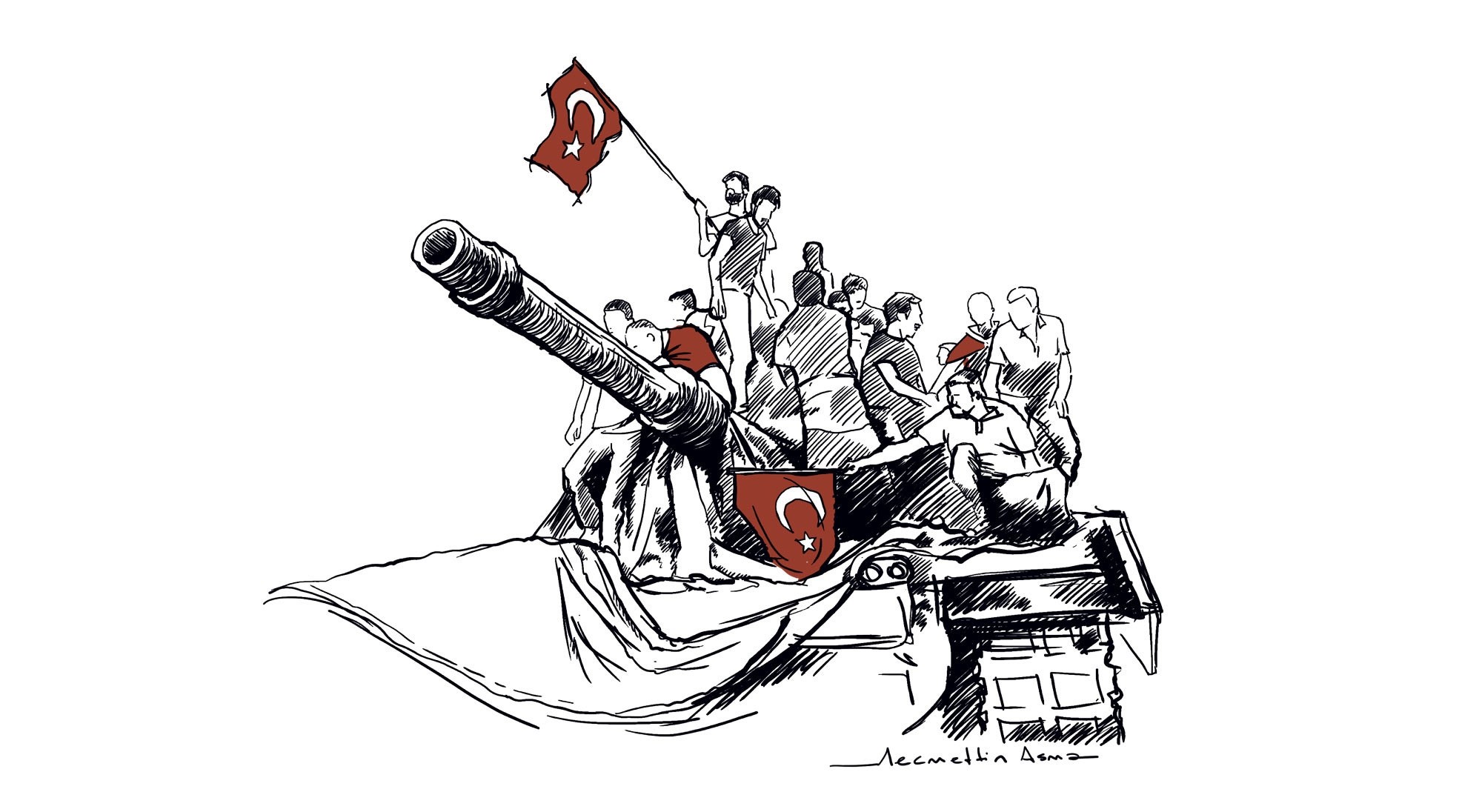A 'tumultuous' event on July 15

July 15 will remain as an unforgettable night in Turkey's history, with our own fighter jets bombing our own Parliament building and our own soldiers opening fire on civilians in several locations throughout the country. Yet what remains in the aftermath of the bloody night is a stronger Turkish democracy and a more hypocritical West
I took my family on a much-deserved but long-delayed summer vacation on July 15. If you are traveling with a family member who is in a wheelchair you get pretty exhausted. Upon reaching our destination on the beautiful Mediterranean Sea, near Antalya, I wanted to relax to the point where only the world ending would get me up. My wife woke me up immediately when she heard the news on television that the world as we know it was about to come to an end: The Turkish military was trying to overthrow the government.The images of the tanks rolling through the streets of Istanbul and Ankara occupied the TV screens; our own fighter jets bombing our Parliament building; our helicopters spraying our Presidential Palace with bullets. However crowds were now also filling the screens. Everybody on social media was asking people to go out and to stop the tanks and prevent the troops from invading the radio stations. President Recep Tayyip Erdoğan, calling TV stations on Facetime, asked people to go out on the streets and roll back the coup. Now millions were on the streets. We had live videos from every corner of Ankara and Istanbul. My wife and I were about the leave the hotel and go to Antalya city center when I saw this rolling text on the TV screen: Professor İlhan Varank was murdered by the soldiers around the Police Headquarters in Istanbul while he was with a group of people defending the building against the soldiers.It was a balmy Istanbul evening on the last day of Ramadan. The next day was Ramadan Bayram, beginning a nine-day holiday. Varank and a common colleague of ours, and our wives, were breaking our fasts. We were anxiously looking forward to this extended holiday. Varank and his wife would host his father and mother.Varank is (was - I still cannot speak in the past-tense when referring to him) a prominent education technology expert at his university. I had followed his career development from the early days. I had a column then in the Turkey edition of Byte magazine. He and his brother used to send me emails when almost no one had the slightest idea what an email was. He was a pioneer in computer science. He had built an email server in his school. He later came to Ohio State University for his graduate studies; he completed his Ph.D. on computer-assisted teaching technologies. Then his younger brother followed in his steps and did graduate studies in the U.S.That night İlhan hodja - as we emphatically address him - promised to visit our new campus and see the smart-classroom technologies we were installing; he proudly said that he might suggest something newer. He was the chairperson of a technical university. The bayram and a long holiday ahead of us, we decided to call each other in the middle of the next month.I was going to call him in a couple of days to set up his visit to our campus.He was surely but humbly going to suggest a new router or a newer model of a server.He was going to greet our people with his sunshine smile, one that made you think you had known him forever.He would share a large bag of hazelnuts from his native Black Sea coast.We would, in short, have a wonderful time - I, learning from him, he, prodding me to criticize Turkish media and politics. But the TV screen was flashing that none of these were possible any more: My friend İlhan, the father of two wonderful children, had been killed defending a police headquarters against the Turkish military.Fifty days later on CNN, U.S. President Barack Obama said that Turkey had gone through "a tumultuous event." He added, "You know, this coup was serious."It was not an ear-shattering event that happened on that fateful night: Our world had been shattered. It was not an ear-piercing event: Our hearths had been pierced. Since I read that rolling text announcing his name and later all 240 names of the deceased, the whole world was soundless. There is only one tumultuous sound in my ears: When are the culprits of this coup attempt going to be punished? The only closure we may have for the fallen and the veterans of that night will come seeing the chief architect of this putsch in a courtroom.The media as well as many government officials, public prosecutors and the arrested soldiers in their testimonies are pointing the finger at one person: Fetullah Gülen, a self-exiled Turkish citizen and a legal resident of Pennsylvania.U.S. authorities have not even put him under provisional arrest yet. This reluctance is fanning the flames of anti-Americanism and provides support to the speculation that Gülen was prepared as the leader of a so-called reformed Islamic movement in the Middle East as part of the U.S. Greater Middle East Project, and now being protected by the neo-cons, who designed and developed it.The president says the U.S. would continue to work with us as we try to stabilize our lives. I am wondering how he is going to do that when his assistant secretary of state who oversees Turkish affairs is married to one of them.
Last Update: September 07, 2016 08:45
